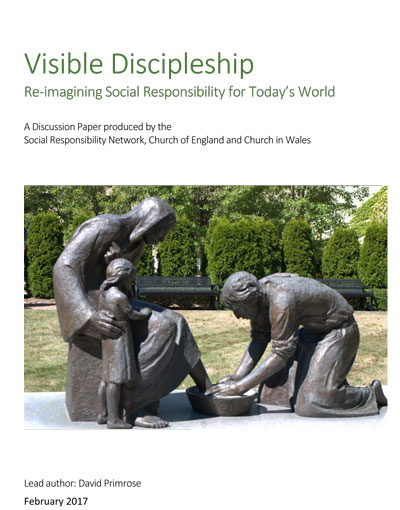Visible discipleship
 People in the Church of England have been exploring how the vision of social justice and a ‘church of the poor’ relates to the Church’s mission. In this guest blog, David Primrose (Church Action on Poverty trustee and Director of Transforming Communities in the Diocese of Lichfield) explains.
People in the Church of England have been exploring how the vision of social justice and a ‘church of the poor’ relates to the Church’s mission. In this guest blog, David Primrose (Church Action on Poverty trustee and Director of Transforming Communities in the Diocese of Lichfield) explains.
“Let our light shine before others, so that they may see your good works and give glory to your Father in heaven.”
With these words, and images of cities on hills and lights on lampstands, the Gospel of Matthew connects the beatitudes with Jesus’ teaching in the sermon on the mount. Visible discipleship is about being the light of the world and recognising how our good works can result in others giving glory to God. Like many other social responsibility officers, I don’t feel comfortable with this, and prefer the subsequent injunction to “beware of practising your piety before others in order to be seen by them; for then you have no reward from your Father in heaven.” So for over a year, social responsibility officers have been considering together how social responsibility impacts the mission of the church. The resultant report, Visible Discipleship, is available free.
 Usually when Christians are asked about their faith, they talk about what they do rather than what they believe. Often they will then struggle to explain the connection between their actions and their beliefs. The extra spiritual dimension that contributes to a holistic understanding of what it means to be human can easily be ignored. What is more problematic is that any naïve assumption that the church is on the side of the poor no longer has common currency. People on either side of the Atlantic don’t trust the establishment to work for the benefit of all, and the alternatives offered thrive on tribalism and othering. The church is perceived to be aligned with the establishment, and hence as much part of the problem as its solution.
Usually when Christians are asked about their faith, they talk about what they do rather than what they believe. Often they will then struggle to explain the connection between their actions and their beliefs. The extra spiritual dimension that contributes to a holistic understanding of what it means to be human can easily be ignored. What is more problematic is that any naïve assumption that the church is on the side of the poor no longer has common currency. People on either side of the Atlantic don’t trust the establishment to work for the benefit of all, and the alternatives offered thrive on tribalism and othering. The church is perceived to be aligned with the establishment, and hence as much part of the problem as its solution.
At a local level, many churches have credibility within their own communities, yet the national Church is treated with suspicion. Inspirational leaders have the skills to engage sporadically with grassroots action; social responsibility officers develop and sustain relationships connecting grassroots experience with national profile. They are able to link together churches with similar aspirations, and maximise connections with like-minded personnel within the secular voluntary and statutory sectors. Recognising that some of the best social action is essentially parochial, social responsibility officers are able to raise the profile of some good works undertaken by local churches.
In order to further this work there are three areas that need urgent attention. First, there needs to be ongoing research into the effectiveness of different forms of social action. This must be from a holistic understanding of wellbeing. Second, people grow as disciples when they are enabled to reflect on their behaviour. This link between faith and action merits further exploration. Third, the commitment to the Common Good demands deeper analysis of what is ‘common’ and what is ‘good.’
